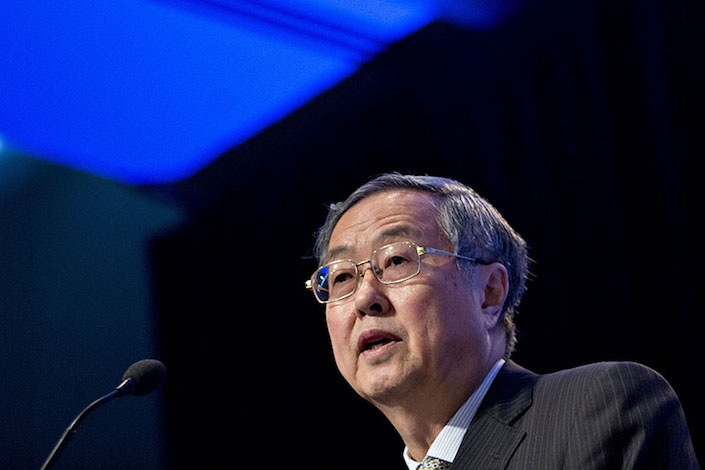Ex-PBOC Chief Denies Central Policy of Forced Tech Transfer

China has no central government policy to force foreign companies to hand over valuable technology, said former central bank governor Zhou Xiaochuan, addressing a trade-war contention of President Donald Trump.
But the country should plug loopholes in practices regarding subsidies and technology transfer in response to external complaints, said the former chief of the People’s Bank of China Wednesday at a seminar in Geneva.
Forced technology transfer, intellectual property violations and industry subsidies are at the center of the Trump administration’s justifications for imposing multiple rounds of punitive tariffs targeting annual imports of $250 billion of Chinese goods over the past months.
“What I want to emphasize is that there is no mandatory policy of technology transfer at the state level,” said Zhou, who stepped down in March as China’s longest-serving central banker.
But there could be loopholes at the local level, and China is stepping up efforts to fix the problems in response to concerns of foreign investors, Zhou said.
China considered granting foreign investors market access in exchange for technology in 1980s as the country launched its opening-up reform, but the situation has changed substantially, Zhou said.
Zhou’s remark echoed those of other Chinese leaders. In March, Premier Li Keqiang promised that China would not force foreign companies investing in China to transfer technology and would treat domestic and foreign companies equally.
China’s public spending is mainly for infrastructure, not subsidies for companies, Zhou said, though there may have been inappropriate practices.
“We are making improvement,” he said. “We should change the mentality and learn more about WTO rules.”
China has been pushing reforms in corporate governance in line with OECD-style "competitive neutrality" — a level playing field for state-owned and private enterprises, Zhou said.
"We haven’t done enough, but we are moving in that direction," he said.
Complaining about China’s industry subsidies and alleging violations related to technology, the Trump administration has slapped tariffs on $50 billion of annual Chinese imports since July. Earlier this week, another batch of tariffs targeting $200 billion of Chinese products were scheduled to take effect next week, putting roughly half of Chinese exports to the U.S. under punitive duties. China has responded with retaliatory tariffs.
Despite the tit-for-tat tariff fight, Zhou said China still expects to ease the trade conflict with the U.S. In an interview with Reuters, Zhou predicted limited impact of the trade war on the Chinese economy, slowing growth by 0.2% to 0.8%. Zhou said China’s 2018 growth could match last year’s 6.5%.
The trade tensions may drive Chinese companies to retreat from the U.S. market and force Chinese exporters to seek alternative markets, which could be a bad news for the U.S., Zhou said.
And the more profound impact of the trade war will be to damage business confidence, he said.
Contact reporter Han Wei (weihan@caixin.com)

- 1China Officials Dismiss Tax Hike Rumors After Tech Selloff
- 2Cover Story: How Gutter Oil Became a Prized Fuel for International Airlines
- 3Prominent Chinese Journalist Liu Hu Detained by Police in Chengdu
- 4Maersk Unit Takes Over CK Hutchison Panama Ports After Court Ruling
- 5China Provinces Set Cautious 2026 Growth Targets
- 1Power To The People: Pintec Serves A Booming Consumer Class
- 2Largest hotel group in Europe accepts UnionPay
- 3UnionPay mobile QuickPass debuts in Hong Kong
- 4UnionPay International launches premium catering privilege U Dining Collection
- 5UnionPay International’s U Plan has covered over 1600 stores overseas






